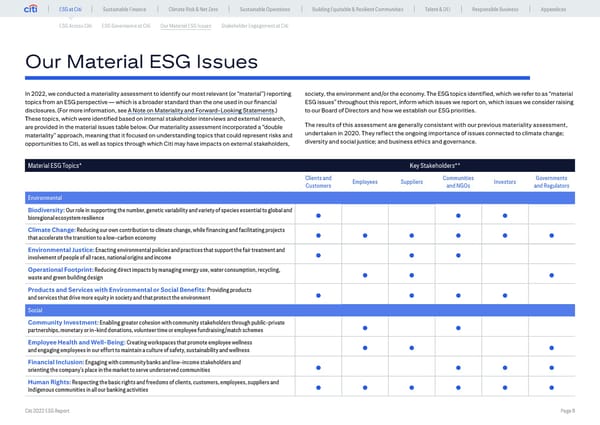ESG at Citi Sustainable Finance Climate Risk & Net Zero Sustainable Operations Building Equitable & Resilient Communities Talent & DEI Responsible Business Appendices ESG Across Citi ESG Governance at Citi Our Material ESG Issues Stakeholder Engagement at Citi Our Material ESG Issues In 2022, we conducted a materiality assessment to identify our most relevant (or “material”) reporting society, the environment and/or the economy. The ESG topics identified, which we refer to as “material topics from an ESG perspective — which is a broader standard than the one used in our financial ESG issues” throughout this report, inform which issues we report on, which issues we consider raising disclosures. (For more information, see A Note on Materiality and Forward-Looking Statements.) to our Board of Directors and how we establish our ESG priorities. These topics, which were identified based on internal stakeholder interviews and external research, are provided in the material issues table below. Our materiality assessment incorporated a “double The results of this assessment are generally consistent with our previous materiality assessment, materiality” approach, meaning that it focused on understanding topics that could represent risks and undertaken in 2020. They reflect the ongoing importance of issues connected to climate change; opportunities to Citi, as well as topics through which Citi may have impacts on external stakeholders, diversity and social justice; and business ethics and governance. Material ESG Topics* Key Stakeholders** Clients and Employees Suppliers Communities Investors Governments Customers and NGOs and Regulators Environmental Biodiversity: Our role in supporting the number, genetic variability and variety of species essential to global and bioregional ecosystem resilience Climate Change: Reducing our own contribution to climate change, while financing and facilitating projects that accelerate the transition to a low-carbon economy Environmental Justice: Enacting environmental policies and practices that support the fair treatment and involvement of people of all races, national origins and income Operational Footprint: Reducing direct impacts by managing energy use, water consumption, recycling, waste and green building design Products and Services with Environmental or Social Benefits: Providing products and services that drive more equity in society and that protect the environment Social Community Investment: Enabling greater cohesion with community stakeholders through public-private partnerships, monetary or in-kind donations, volunteer time or employee fundraising/match schemes Employee Health and Well-Being: Creating workspaces that promote employee wellness and engaging employees in our effort to maintain a culture of safety, sustainability and wellness Financial Inclusion: Engaging with community banks and low-income stakeholders and orienting the company’s place in the market to serve underserved communities Human Rights: Respecting the basic rights and freedoms of clients, customers, employees, suppliers and Indigenous communities in all our banking activities CCiitti 2i 200222 E2 ESSG RG Reeppoorrtt PPaagge 8e 8
 Global ESG Report 2022 Citi Bookmarked Page 7 Page 9
Global ESG Report 2022 Citi Bookmarked Page 7 Page 9